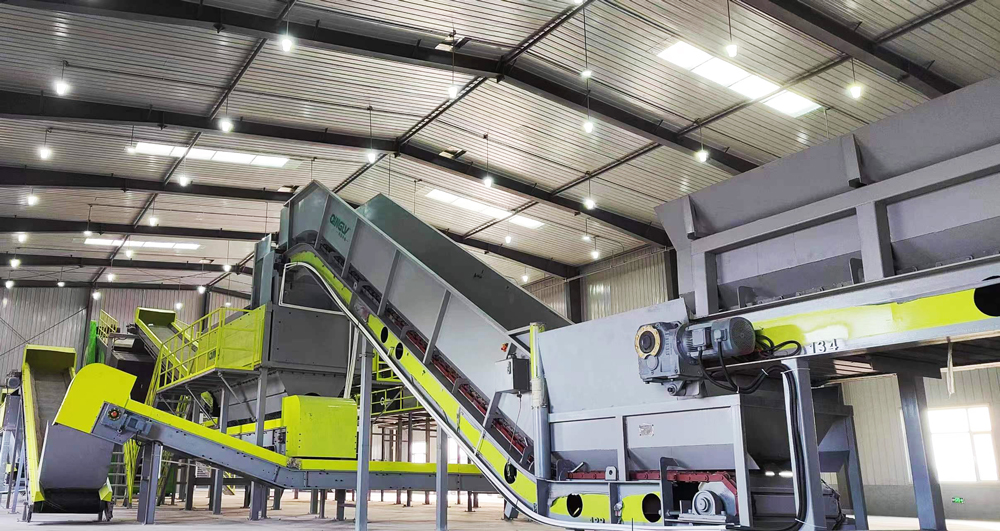 Time:2024-12-13
Time:2024-12-13
 Source:青绿环境
Source:青绿环境
As the urbanization process in our country accelerates, the problem of domestic waste in rural towns is becoming increasingly prominent. Traditional waste disposal methods such as landfilling and incineration not only occupy a large area and have high costs but may also cause secondary environmental pollution. Therefore, exploring efficient and environmentally friendly domestic waste sorting and treatment technologies has become the key to solving this problem. In recent years, the emergence and development of domestic waste sorting and treatment equipment have provided a brand-new solution for rural towns.

I. The Importance of Domestic Waste Sorting and Treatment Equipment
Due to factors such as relatively low population density and dispersed geographical distribution, rural towns face significant challenges in waste collection and transportation. Domestic waste sorting and treatment equipment can classify and treat waste directly at the source or transfer stations, reducing waste volume, increasing resource recovery rates, and decreasing the amount of waste that ultimately needs to be landfilled or incinerated. This not only helps save land resources but also effectively reduces environmental pollution, promoting the development of a circular economy.
Moreover, by promoting the use of domestic waste sorting and treatment equipment, villagers can be educated and guided to develop good waste sorting habits, enhancing their environmental awareness and sense of social responsibility, thus creating a positive atmosphere of participation from the whole society.
II. Working Principle and Technical Features of Domestic Waste Sorting and Treatment Equipment
1. Pre-treatment stage: First, the collected domestic waste is sent into the pre-treatment system to remove large debris (such as furniture, branches, etc.), and then crushed into smaller particles by a crusher for easier operation in subsequent processes.
2. Automated sorting: Using advanced sensing technology and intelligent algorithms, automatically identify and separate different types of waste components, such as plastics, metals, glass, paper, and other organic materials. For example, optical sensors can distinguish plastic bottles based on the color and reflection characteristics of the materials; magnetic separators are used to capture iron items; air classification is based on the weight differences of various substances for sorting.
3. Biodegradation and composting: For biodegradable kitchen waste and other organic waste, it can be transformed into organic fertilizer through anaerobic fermentation or aerobic composting, reducing the total amount of waste and achieving resource reuse.
4. Compression and packaging: Non-recyclable waste after sorting is compressed into blocks for easy storage and transportation, while reducing the risk of leakage during transportation.
5. Waste gas and wastewater treatment: Waste gas and wastewater generated during the entire treatment process also need to be properly treated to prevent negative impacts on the surrounding environment. Modern equipment is usually equipped with efficient waste gas purification devices and wastewater treatment systems to ensure that emissions meet national environmental protection standards.
III. Application Prospects of Domestic Waste Sorting and Treatment Equipment
Currently, many rural towns across the country have begun to introduce and apply domestic waste sorting and treatment equipment, achieving significant results. These devices not only improve the local quality of life but also promote the construction of beautiful rural areas. In the future, with increased policy support and continuous improvement of technological levels, it is expected that more rural areas will adopt such equipment, forming a complete management system for rural domestic waste.
To better utilize the role of domestic waste sorting and treatment equipment, the government should increase financial investment in related facility construction and technology research and development, formulate and improve corresponding laws and regulations, and encourage social capital to participate. At the same time, it is also necessary to strengthen publicity and education among farmers, popularize scientific and reasonable waste sorting knowledge, so that everyone becomes a participant and supporter of environmental protection.
In summary, domestic waste sorting and treatment equipment provides a feasible path to solve the problem of domestic waste in rural towns. It not only meets the needs of current social development but also lays a solid foundation for achieving sustainable development goals. Through the joint efforts of all parties, it is believed that the environmental sanitation of rural areas in our country will be significantly improved, leaving a blue sky and green land for future generations.













 Prev
Prev











